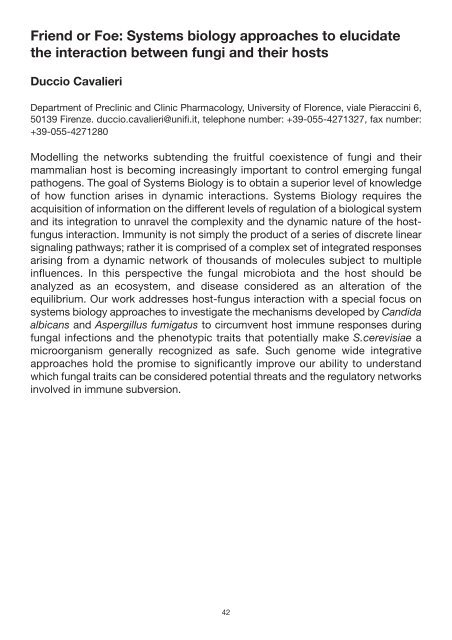Candida Infection Biology – fungal armoury, battlefields ... - FINSysB
Candida Infection Biology – fungal armoury, battlefields ... - FINSysB
Candida Infection Biology – fungal armoury, battlefields ... - FINSysB
You also want an ePaper? Increase the reach of your titles
YUMPU automatically turns print PDFs into web optimized ePapers that Google loves.
Friend or Foe: Systems biology approaches to elucidate<br />
the interaction between fungi and their hosts<br />
Duccio Cavalieri<br />
Department of Preclinic and Clinic Pharmacology, University of Florence, viale Pieraccini 6,<br />
50139 Firenze. duccio.cavalieri@unifi.it, telephone number: +39-055-4271327, fax number:<br />
+39-055-4271280<br />
Modelling the networks subtending the fruitful coexistence of fungi and their<br />
mammalian host is becoming increasingly important to control emerging <strong>fungal</strong><br />
pathogens. The goal of Systems <strong>Biology</strong> is to obtain a superior level of knowledge<br />
of how function arises in dynamic interactions. Systems <strong>Biology</strong> requires the<br />
acquisition of information on the different levels of regulation of a biological system<br />
and its integration to unravel the complexity and the dynamic nature of the hostfungus<br />
interaction. Immunity is not simply the product of a series of discrete linear<br />
signaling pathways; rather it is comprised of a complex set of integrated responses<br />
arising from a dynamic network of thousands of molecules subject to multiple<br />
influences. In this perspective the <strong>fungal</strong> microbiota and the host should be<br />
analyzed as an ecosystem, and disease considered as an alteration of the<br />
equilibrium. Our work addresses host-fungus interaction with a special focus on<br />
systems biology approaches to investigate the mechanisms developed by <strong>Candida</strong><br />
albicans and Aspergillus fumigatus to circumvent host immune responses during<br />
<strong>fungal</strong> infections and the phenotypic traits that potentially make S.cerevisiae a<br />
microorganism generally recognized as safe. Such genome wide integrative<br />
approaches hold the promise to significantly improve our ability to understand<br />
which <strong>fungal</strong> traits can be considered potential threats and the regulatory networks<br />
involved in immune subversion.<br />
42


